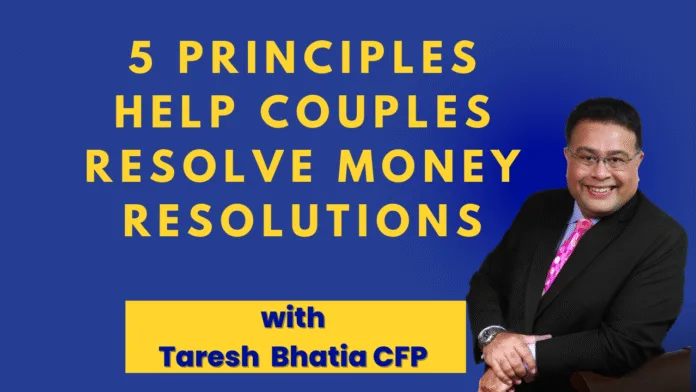Introduction: When Love Meets Ledger
In my years of coaching Indian couples—young professionals just married, elderly parents living with their children, even widowed in-laws raising grandchildren—I’ve witnessed one thing over and over again: money is not just about numbers; it’s about emotions, power, control, and identity.
I remember once meeting a father-son duo living under one roof with their respective families. They were constantly clashing over what to do with their collective money. The father insisted on buying property; the son was all in for stock market investments. The tension in their household wasn’t because either of them was irresponsible—it was because they lacked a shared financial language.
Just like institutions use frameworks, principles, and committees to manage funds efficiently, I believe every household—no matter how small—needs some ground rules for money. Without this foundation, even love can crumble under the pressure of mismatched financial expectations.
Let me walk you through 5 simple, proven principles that have helped couples resolve money conflicts effectively and effortlessly.
Principle 1: Ground Rules Create Common Ground

Without clarity, even love becomes chaotic.
Early in my coaching journey, I met a newlywed couple—both high-earning IT professionals. The wife was passionate about savings and retirement planning. The husband, a free spirit, believed in “living life to the fullest.” They loved each other deeply—but money discussions often turned into arguments.
So I helped them set ground rules.
- Every month, they would first invest a fixed amount before planning expenses.
- No borrowing for wants—only needs.
- Vacations, shopping, and gifting had preset annual budgets.
- Each had personal freedom to spend a part of their income as they pleased—no questions asked.
Once these rules became non-negotiable, their arguments vanished. They started celebrating financial wins together, instead of blaming each other.
Tip: Set rules not out of control, but out of clarity. The rules should reflect shared values.
Principle 2: Transparency Is the Ultimate Trust Builder
Secrets and money don’t mix well—especially in a marriage.
One of the most heartbreaking stories I witnessed was of a widowed mother-in-law and her working daughter-in-law. After the son’s passing, they lived together with the grandchildren. The daughter-in-law would hand over a monthly allowance but never disclosed her income. The older woman felt cheated and constantly complained.
When I facilitated a dialogue, they both broke down in tears. The daughter-in-law was saving aggressively for her kids’ future, but the lack of openness had caused a deep trust deficit.
We introduced a simple rule: monthly money review meetings. They listed income, expenses, and savings openly. The mother-in-law even contributed by cooking and managing groceries more efficiently.
Tip: Transparency in money isn’t about permission; it’s about partnership.
Principle 3: Separate “Personal” From “Common” Money

A happy home respects individuality within togetherness.
A senior couple I mentored had been married for over 30 years. The husband was a disciplined saver, the wife a generous giver. They often fought because she would donate large amounts from the household savings without his knowledge.
Also read: How is this Money Triangle Important for Couples Finance Formula™?
We fixed this by creating three buckets:
- Common Pool – Joint responsibilities like rent, groceries, kids’ school.
- Personal Fund – A fixed amount each could spend freely.
- Goal-Based Fund – Education, retirement, health.
Now, she could donate guilt-free from her personal fund. And he didn’t feel betrayed anymore.
Tip: Budgeting isn’t about restrictions—it’s about respecting roles.
Principle 4: Let Goals Drive Investments, Not Personal Bias
Your goals are the GPS. Your investments are the vehicle.
Often, couples argue over whether to invest in property, gold, stocks, or mutual funds. I remind them that the goal must lead the choice, not personal preference.
In one session, a young mother and her widowed mother-in-law were always clashing. The grandmother wanted FDs; the mother wanted SIPs. Both were right—but for different timelines.
We mapped their goals:
- Child’s education – 10 years away → SIP in equity mutual funds
- Emergency health needs – immediate → FD and liquid funds
- Rent deposit for new house – 1 year away → short-term debt funds
Once investments aligned with timelines, the arguments vanished.
Tip: Agree on goals first. Then plan investments.
Principle 5: Budget for Joy—Not Just Survival

If you don’t budget for celebration, you will end up resenting money.
I’ve seen families break down during birthdays, Diwali, or vacations—not because they lacked funds, but because they didn’t plan for it.
A couple once told me they always ended up fighting during their child’s birthday planning. One wanted a big party, the other preferred a quiet dinner. Their expenses often went out of control, leading to debt and disappointment.
We introduced the idea of a Joy Budget—an annual limit for celebrations, agreed upon in advance. They also created a “wishlist calendar” for upcoming events. Now, celebrations became stress-free and fun again.
Tip: Budgeting joyfully is still financial planning. Just more colourful.
Bonus: Technical Decisions? Bring in a Neutral Expert
Whether it’s choosing a 15-year home loan over 30, deciding between floating and fixed interest, or calculating prepayment benefits—technical money matters can turn emotional very fast.
One family was debating a second home loan, and the arguments got so heated that they stopped speaking for a week. I simply put the options on paper—interest paid, tax saved, EMI impact, liquidity needs. Once facts were visible, the fog cleared.
Tip: Don’t let assumptions rule decisions. Let data and expert advice guide you.
Final Word: Shared Principles, Shared Peace

Financial harmony isn’t about perfect incomes or identical values. It’s about acknowledging differences and still building unity.
It takes vulnerability, empathy, and a commitment to “we over me.” You may not agree on every rupee spent, but with shared principles, you’ll never feel unheard, unseen, or unloved.
As a CERTIFIED FINANCIAL PLANNER™, I’ve seen transformations happen—not just in bank balances, but in relationships. Because when couples align their money with mutual understanding, they don’t just grow rich—they grow closer.
The author of this article, Taresh Bhatia, is a Certified Financial Planner® and advocate for female empowerment. For more information and personalized financial guidance, please contact taresh@tareshbhatia.com
He has authored an Amazon best seller-“The Richness Principles”. He is the Coach and founder of The Richness Academy, an online coaching courses forum. This article serves educational purposes only and does not constitute financial advice. Consultation with a qualified financial professional is recommended before making any investment decisions. An educational purpose article only and not any advice whatsoever.
©️2025: All Rights Reserved. Taresh Bhatia. Certified Financial Planner®
Subscribe Now for Upcoming Blogs!
[convertkit form=6555951]
📢 Join free live webinar —
Couple Finance Formula™ Register here




